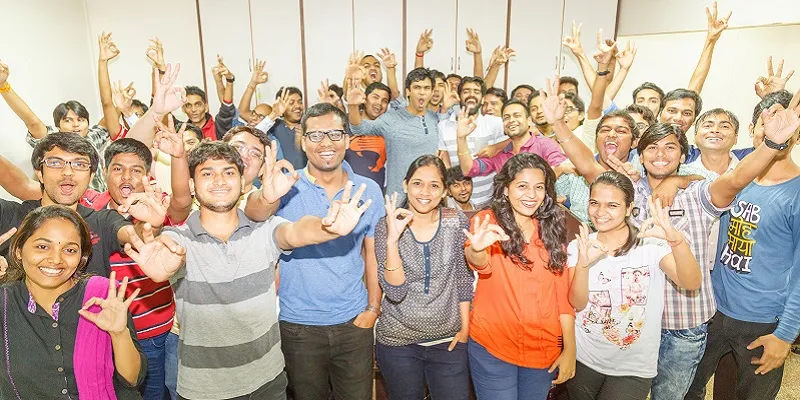Doormint shuts operations. Crisis or correction for online laundry startups?
Entrepreneurship is a learning experience teamed with grit, grind and pain.
These words were uttered by Doormint’s Founder Abhinav Agarwal a few months ago. Since then, the grind and pain largely dominated the entrepreneurial experience at Doormint and the online laundry marketplace shut operations on September 17 this year, confirmed Abhinav to YourStory.
Doormint pivoted from an on-demand services marketplace to an online marketplace for the laundry business, to scale, but the company couldn’t achieve the growth they had envisioned. Speaking to YourStory, Abhinav said:
It was coming for the past couple of months now. We couldn’t justify or see a positive unit economics. The market was also getting exceedingly tough. We have been trying to fundraise for a while now, but we only saw a wary bunch of investors. The past year has been a roller-coaster ride for all of us. From pivoting to laundry to fund raising and trying to scale in a tough environment, the journey has been difficult.

Where is the unit economics?
Abhinav said that it just made sense for the team to shut operations and move ahead. Speaking of the existing employees, he added:
We have informed all our employees and given them a 45-day severance package. We are also working closely with our investors and contacts to ensure that they (employees) find suitable jobs as soon as possible.
Abhinav’s talk on the difficulty of achieving unit economics in the online laundry space echoes the market talks on funding crunch, sanity and correction phase that the ecosystem is going through.
Abhinav and his friend, Naman Lahoty, started Doormint out of the need to organise the handyman services marketplace. Founded in September 2014, Doormint operated across Mumbai in seven to eight categories, but they soon pivoted to laundry services.
“When we sat back and reviewed our progress, we realised that none of these categories were linked. The supply for each was different, and being a full-stack player, ensuring quality of service in each category became difficult,” said Abhinav.

The winter that has been coming for a while now
Doormint raised Rs 60 lakh in their first round of funding from Powai Lake Ventures in early 2015. In August 2015, the team launched laundry as one of their service categories and raised $3 million in funding led by Helion Ventures and Kalaari Capital.
But this time around, fundraising wasn’t easy. Speaking of shutting operations, Abhinav added:
The process of shutting and winding operations isn't easy for any entrepreneur. But the realities of the market today are very different from what they were a year ago. The margins and costs are high and investors are more cautious. Today, the focus is stronger towards the unit economics, and justification of the same. We unfortunately have been unable to achieve that.
There has been a 40-percent decline in funding this year as compared to last year. Most of the shutdowns and exits are either due to lack of funds or rising competition.
Agreeing to this shift, Parag Dhol, Managing Director of Inventus Capital, believed that hedge funds have gone into hibernation. Most investors seem to be more cautious with their investment decisions this year.
As the dependency on investors and high cash burn cannot be a survival strategy anymore, entrepreneurs are now expected to show more sustainable business models with a focus on unit economics.
Srini Vudayagiri, Investment Director at Peepul Capital, said that last year was one of frenzied activity, excess, and exuberance. He felt the strong FOMO (fear of missing out) mentality was leading people astray.
He added:
The ‘Uber for X’ model was simply exploding everywhere. Basic business models were blind-sided; startups were invested in on the basis of PhDs or degrees. I remember being one of the odd ones for asking basic unit economics and models. Today, this is what seems to be driving investments.
Dirty business of laundry
In 2015, on-demand laundry sector was filled with startups looking to organise the unorganised services. But a year down the line, only a few have stood the test of time. After Wassup acquired Chammak in November 2015, Housejoy acquired My Wash in February 2016.
Satyam Mishra, Co-founder of Urban Dhobi, told YourStory that in 2015 alone, over 20 on-demand laundry startups entered the market. He added:
Laundry is a necessary evil, and even during recession, people will not stop washing their existing clothes.
The laundry market even today is a highly unorganised sector. If you look at the reports, the numbers seem very lucrative. A report by Euromonitor suggests that the unorganised laundry sector is worth Rs 2,00,000 crore in India.
And only five percent of the market is organised. It was one of the most important sectors (along with food tech and logistics) that received massive investor love last year. So what has changed within a year?
One of the biggest challenges for online laundry marketplaces is consistency of services. Experts believe that the market currently is dominated by local dhobis, maids and dry cleaners. This makes it difficult to attract skilled labour and bring the consistency to ensure customer satisfaction.
Also, the unit economics of the model just don't work out, especially if you take customer acquisition costs into account (as Abhinav mentioned above). Balachandar R, Founder and CEO of Wassup, noted that the industry backend for laundry services is quite underdeveloped.
This means that startups and founders need to put in consistent efforts to ensure that the entire ecosystem goes through a sea of change to achieve further efficiency. Thus, aggregation alone cannot be the answer.
(With inputs from Jai Vardhan)







